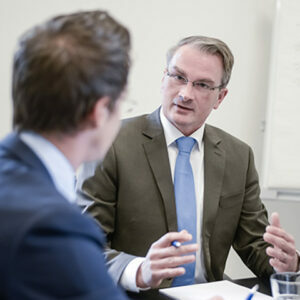Highest product quality at all times – a goal that every company strives for. But even in the event of a deficency, a company should be well prepared in order to avert greater damage. In an interview, attorney Dr. Markus Grube from the law firm for food and consumer goods law, KWG Rechtsanwälte, explains what is important in an emergency.
Dr. Grube, what must a company do when confronted with a potential quality defect?
First of all, the company is obliged to investigate the matter. The product and its components should be examined in detail both internally and by external, professionally qualified laboratories. If the suspicion of a defect is confirmed, certain legal regulations may apply, making it imperative to take action. In order to obtain clarity, test and laboratory results, as well as customer information and consumer complaints, should be understood and evaluated.
What kind of evidence should a company have on hand at all times?
Evidence that provides information about the origin of products or goods used in the manufacture of the company’s own product must always be available at short notice. Information about buyers of the company’s own product must also be available. In other words, the path of a product and its ingredients must be traceable along the entire value chain.
What steps must be taken if a defect is confirmed?
If the suspicion is confirmed that, for example, unsafe food has been placed on the market, and thus potentially harmful products or products that are unsuitable for human consumption, i.e. have serious quality defects, market-related measures such as a recall of the affected product must be considered.
When do I have to start an official recall? How must this be published?
Whenever potentially harmful food is in circulation that may have reached the end consumer, these products must be publicly recalled. The information about the recall, which also includes a warning to consumers against further consumption, takes place via the media. As a rule, the recall is published in coordination with the responsible state ministries via the appropriate press distribution lists.
What are the most common mistakes in dealing with product recalls?
The most serious of these are public recalls that are not necessary and omitted recalls. Both lead – at different times – to damage to a company’s image, which sometimes poses an existential threat. In general, however, inconsistent procedures are also problematic. One thing is clear: a food product is either safe or it is unsafe. There is nothing in between. That is why there should be no “half measures”, such as a “silent recall”, when a public recall is required. Basically, companies that in the event of a defect do not show the necessary degree of transparency to consumers, trading partners and authorities can only lose.
What should an ideal communication attitude look like during a crisis? And what role do authorities play? Which kind of information do I need to pass on, to whom and within what timeframe?
Above all, it is important not to communicate until there are messages. While internal investigations are ongoing, the company should remain calm and use the time to prepare for a potential crisis in terms of communications. The authorities should be called in when the internal review has reached its conclusions. If a public recall is necessary, the relevant authorities must be informed of the measure in advance. If the recall concerns products in the purely commercial sector, so that they can be withdrawn without media warning, this action must still be reported to the authorities if the reason for the recall is due to food safety.
How can I protect myself against damage caused by false accusations and, if necessary, claim compensation myself?
False accusations should be countered at an early stage by clarifying the actual factual situation. In general, it is also difficult for companies to claim damages or official liability if there is a suspicion that food is unsafe. This is because consumer protection takes precedence in this case. If a measure later proves to be unnecessary in retrospect, the acting authorities cannot be blamed. In this case, therefore, the only thing that can be done is to try to underline the company’s claim to quality and the safety of its own products by means of open and credible communication, and thus to regain the trust of consumers and trading partners more quickly in retrospect.
Picture credits © KWG Rechtsanwälte


